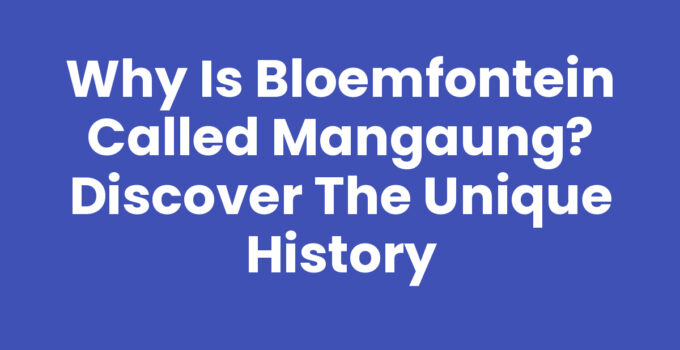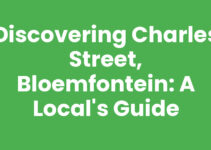Bloemfontein, one of South Africa’s three capital cities, is often referred to by its Sesotho name, Mangaung. Understanding why Bloemfontein is called Mangaung is essential for grasping the region’s rich cultural heritage and historical significance. This article explores the origins of the name, the meaning behind it, and provides insights into the city that embodies this unique identity.
Why is Bloemfontein called Mangaung: History and Meaning
The name Mangaung originates from the Sesotho language, meaning ‘place of cheetahs’. This name is steeped in history, reflecting the indigenous cultures that thrived in the area long before European colonization. The settlement that would grow into Bloemfontein was established in 1846, largely due to the increasing migration of the Boer population during the Great Trek. However, the roots of the name tie directly back to the Basotho people, who occupied the land.
The indigenous people named the area Mangaung due to the presence of cheetahs that were common in the surrounding plains and their significance in Basotho culture as symbols of speed and agility. Cheetahs were not merely animals but embodied the values and lifestyle of the people.
Over time, with the establishment of the Boer republic and the subsequent declaration of Bloemfontein as the capital of the Orange Free State in 1854, the European name began to dominate. However, the original name, Mangaung, continues to be a significant part of the city’s identity. Today, the local government and various cultural institutions ensure that the historical importance of Mangaung is celebrated and acknowledged.
Recommended Guide: Exploring the Beauty of Stone, Bloemfontein: A Guide
The Cultural Significance of Mangaung Today
In contemporary times, the name Mangaung is not only a reflection of the city’s heritage but also symbolizes a broader recognition of the indigenous cultures of South Africa. The Mangaung Metropolitan Municipality encompasses Bloemfontein and its surrounding areas, fostering a sense of unity and cultural pride among residents.
The municipality promotes various cultural events and activities that highlight the rich history of the region, from traditional music and dance performances to local art exhibitions. Events like the Mangaung African Cultural Festival allow the community to showcase their rich cultural heritage while drawing visitors from both local and international audiences.
Mangaung is also home to several important historical sites that offer insights into the city’s past. For instance, the Old Presidency and the National Museum of Military History offer an educational experience for those looking to understand not only Bloemfontein’s history but also the role it played during key events in South Africa’s past.
See Also: Explore the Anglo-Boer War Museum, Bloemfontein: A Historical Journey
Modern-Day Bloemfontein: A Fusion of Cultures
Bloemfontein, while retaining its historical essence associated with the name Mangaung, has evolved into a vibrant city that now represents a fusion of various cultures. As South Africa continues to develop, so does Bloemfontein, embracing diversity while honoring its historical narratives.
The city today is notable for its educational institutions, including the University of the Free State, which attracts students from various backgrounds and cultures, contributing to the city’s growing multicultural identity. The presence of universities and colleges has also sparked economic development, offering pathways for innovation and entrepreneurship.
Moreover, the local cuisine has been influenced by both the indigenous cultures and the influx of different populations over the years. Visitors to Bloemfontein can enjoy a range of culinary delights, from traditional Basotho dishes to modern interpretations that represent the city’s evolving tastes.
In summary, Bloemfontein is called Mangaung due to a historical and cultural legacy that binds the past to the present. The city’s ongoing commitment to celebrating and preserving its indigenous heritage ensures that the name Mangaung continues to resonate with current and future generations.
Check This: Explore Brompton Road, Bloemfontein: Your Ultimate Guide
Conclusion
Understanding why Bloemfontein is called Mangaung provides a window into the rich tapestry of South African history and culture. As the city keeps its road towards modernity, it remains anchored by the significance of its roots, symbolized by the name Mangaung, which reminds both residents and visitors of the city’s vibrant heritage. As this historical site continues to evolve, the story of Mangaung will undoubtedly continue to unfold.
See Also: Top Places to Visit in Papestad, Bloemfontein for Travelers
Frequently Asked Questions
What does Mangaung mean in Sesotho?
Mangaung means 'place of cheetahs' in the Sesotho language.
When was Bloemfontein established?
Bloemfontein was established in 1846 by the Boer settlers during the Great Trek.
What is the significance of Mangaung in local culture?
Mangaung symbolizes the historical and cultural heritage of the indigenous Basotho people and is celebrated in various cultural events.



